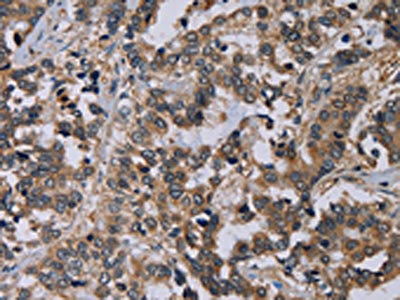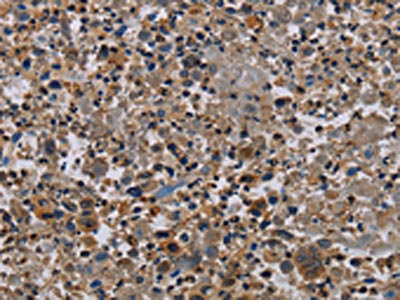
The image on the left is immunohistochemistry of paraffin-embedded Human liver cancer tissue using CSB-PA190585(PVRL4 Antibody) at dilution 1/60, on the right is treated with fusion protein. (Original magnification: x200)
PVRL4 Antibody

CSB-PA190585
ApplicationsWestern Blot, ELISA, ImmunoHistoChemistry
Product group Antibodies
ReactivityHuman
TargetNECTIN4
Overview
- SupplierCusabio
- Product NamePVRL4 Antibody
- Delivery Days Customer20
- ApplicationsWestern Blot, ELISA, ImmunoHistoChemistry
- CertificationResearch Use Only
- ClonalityPolyclonal
- ConjugateUnconjugated
- Gene ID81607
- Target nameNECTIN4
- Target descriptionnectin cell adhesion molecule 4
- Target synonymsEDSS1; Ig superfamily receptor LNIR; LNIR; nectin 4; nectin-4; poliovirus receptor-related 4; poliovirus receptor-related protein 4; PRR4; PVRL4
- HostRabbit
- IsotypeIgG
- Protein IDQ96NY8
- Protein NameNectin-4
- Scientific DescriptionThis gene encodes a member of the nectin family. The encoded protein contains two immunoglobulin-like (Ig-like) C2-type domains and one Ig-like V-type domain. It is involved in cell adhesion through trans-homophilic and -heterophilic interactions. It is a single-pass type I membrane protein. The soluble form is produced by proteolytic cleavage at the cell surface by the metalloproteinase ADAM17/TACE. The secreted form is found in both breast tumor cell lines and breast tumor patients. Mutations in this gene are the cause of ectodermal dysplasia-syndactyly syndrome type 1, an autosomal recessive disorder. Alternatively spliced transcript variants have been found but the full-length nature of the variant has not been determined.
- ReactivityHuman
- Storage Instruction-20°C or -80°C
- UNSPSC12352203


